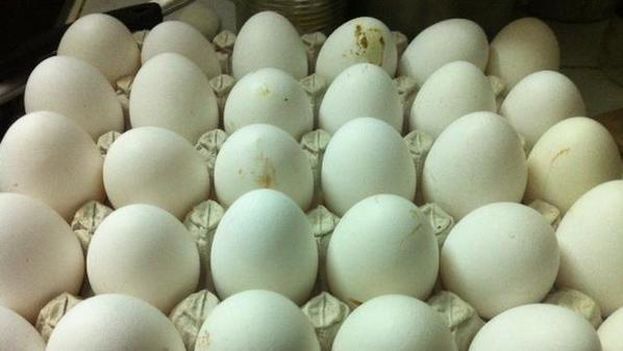
Nineteen citizens who worked for the Havana Base Business Unit for the Collection and Distribution of Eggs and the Provincial Commerce Company were sentenced this week for the diversion of more than eight million eggs. The Prosecutor asked for sentences ranging from 8 to 20 years, according to a report today in the newspaper Granma.
The diverted merchandise represented 389 invoiced shipments that never reached their destination, which caused “an economic impact exceeding 8,907,562 pesos.” The official newspaper referred to the crimes imputed to the accused as ranging from misappropriation to falsification of bank and commercial documents.
The systematic theft began in March of 2012 when the Avicola Production and Commercialization Company officially took on the UEB Collection and Distribution of Havana Eggs. A short time later, after intensive analysis of the entity’s situation, the director of UEB asked to be released due to “illness, which pointed to the existence of serious irregularities.”
From that moment, an investigation of the free distribution of eggs in the capital was opened. A complaint was also opened before the Territorial Department of Criminal Investigations and Operations and a special audit of UEB requested.
With these new controls, “there came to light accounting errors, breaches of obligations on the part of the directors, specialists and drivers, violations of established routes for the delivery of eggs, the falsification of invoices; as well as the existence of an entire criminal chain, fueled by the lacerating lack of control, the vulnerability of the procedures and the total loss of ethical and moral principles.”
An article presented the testimony of the penal investigators in the case, first deputy Barbara Rondon Vega and Capital Pedro E. Cordero Riveron, belonging to the Criminal Investigation and Operations Division. According to Granma, Gilberto Diaz Mojena, UEB marketing, “authorized the billing of notable quantitites of eggs to different entities, located in the municipalities of La Habana del Este, Cerro, Mrianao and La Lisa, basically.”
Cartons of eggs, with thirty units each, were sold on the black market at a price between 35 and 40 Cuban pesos
“At the end of the month […] María Regla Pis Martínez, deputy director of commerce of the Provincial Trading Company […] altered the actual pre-prepared plan for units located in those areas, to make them coincide with the actual deliveries.”
Another of those involved, the driver Valery Caballero Moreda, “with the illegal sale of 1,209,600 eggs, contained in 53 invoices, caused a monetary effect upwards of 1,814,400 pesos. Meanwhile, the driver Juan Eliecer Perdomo caused a shortfall of 839,700 pesos, due to the illegal distribution of 559,800 eggs, corresponding to 29 invoices.”
The cartons of eggs, with thirty units each, were sold on the black market at a price between 35 and 40 Cuban pesos, although at times of scarcities the price could go much higher.
Granma concludes that, “While it’s true that the convictions, although severe, don’t resolve the problem alone, sometimes the malefactors need to feel the full weight of the Law, beyond their shame in front of their families and society.”
